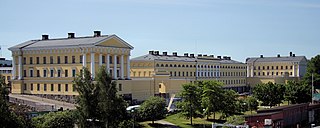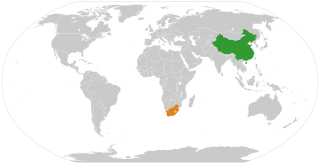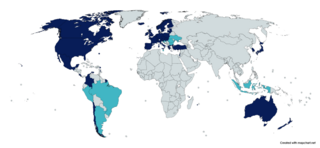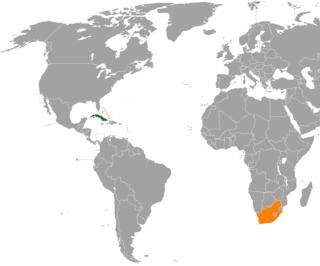
Foreign relations of Kazakhstan are primarily based on economic and political security. The Nazarbayev administration has tried to balance relations with Russia and the United States by sending petroleum and natural gas to its northern neighbor at artificially low prices while assisting the U.S. in the War on Terror. Kazakhstan is a member of the United Nations, Collective Security Treaty Organization, Organization for Security and Co-operation in Europe, North Atlantic Cooperation Council, Commonwealth of Independent States, the Shanghai Cooperation Organisation, and NATO's Partnership for Peace program. Kazakhstan established a customs union with Russia and Belarus, transformed into the Eurasian Economical Community then in 2015 into the Eurasian Economic Union. President Nazarbayev has prioritized economic diplomacy into Kazakhstan's foreign policy.

Foreign relations of Israel refers to diplomatic and trade relations between Israel and other countries around the world. Israel has diplomatic ties with 164 of the other 192 UN member states as of December 2020. Israel is a member of the United Nations (UN) and a number of other international organisations. Israel maintains full diplomatic relations with two of its Arab neighbours, Egypt and Jordan, after signing peace treaties in 1979 and 1994 respectively. In 2020, Israel signed agreements establishing diplomatic relations with four Arab League countries, Bahrain, the United Arab Emirates, Sudan and Morocco. As of 2021, Israel had formal diplomatic relations with 168 other countries, while twenty-eight UN member states have either never established, or have broken off diplomatic relations with Israel.
Global Affairs Canada is the department of the Government of Canada that manages Canada's diplomatic and consular relations, promotes Canadian international trade, and leads Canada's international development and humanitarian assistance. It is also responsible for maintaining Canadian government offices abroad with diplomatic and consular status on behalf of all government departments.

James Phillip Rubin is an American former diplomat and journalist who served as U.S. Assistant Secretary of State for Public Affairs in the Clinton Administration from 1997–2000. He wrote a regular column on foreign affairs for The Sunday Times of London, and is currently Diplomatic Counselor to the newly elected Secretary General of the Organization for Economic Cooperation and Development (OECD).

Development aid is a type of foreign/international/overseas aid given by governments and other agencies to support the economic, environmental, social, and political development of developing countries. Closely related concepts include: developmental aid, development assistance, official development assistance, development policy, development cooperation and technical assistance. It is distinguished from humanitarian aid by aiming at a sustained improvement in the conditions in a developing country, rather than short-term relief. Development aid is thus widely seen as a major way to meet Sustainable Development Goal 1 for the developing nations.
Danish International Development Agency (DANIDA) is the brand used by the Ministry of Foreign Affairs of Denmark when it provides humanitarian aid and development assistance to other countries, with focus on developing countries. There is no distinct Danida organisation within the Ministry.

The Department of Foreign Affairs and Trade (DFAT) is the department of the Australian federal government responsible for foreign policy and relations, international aid, consular services and trade and investment. Australia's total official development assistance (ODA) decreased in 2022 due to differences in Australia's financial year reporting and the timing of its COVID-19-related expenditure, representing 0.19% of gross national income (GNI).

The Ministry for Foreign Affairs (MFA) is a ministry in the Finnish Government and is responsible for preparing and implementing the government's foreign policy.

The Directorate-General for International Partnerships is the European Commission department responsible for international development policy. It operates under the authority of the European Commissioner for International Partnerships, Jutta Urpilainen.

The Organisation for Economic Co-operation and Development's (OECD) Development Assistance Committee (DAC) is a forum to discuss issues surrounding aid, development and poverty reduction in developing countries. It describes itself as being the "venue and voice" of the world's major donor countries.

The Ministry of Foreign Affairs is the Netherlands' ministry responsible for foreign relations, foreign policy, international development, international trade, diaspora and matters dealing with the European Union, NATO and the Benelux Union. The ministry was created in 1798, as the Department of Foreign Affairs of the Batavian Republic. In 1876, it became the Ministry of Foreign Affairs.

The Ministry of External Affairs of India is the government agency responsible for implementing Indian foreign policy. The Ministry of External Affairs is headed by the Minister of External Affairs, a Cabinet Minister. The Foreign Secretary, an Indian Foreign Service officer, is the most senior civil servant who is the head of the Department of Foreign Affairs. The Ministry represents the Government of India through embassies and is also responsible for India's representation at the United Nations and other international organizations and expanding and safeguarding India's influence and Indian interests across the world by providing developmental aid to other countries worth billions of dollars. It also advises other Ministries and State Governments on foreign governments and institutions.

Maite Emily Nkoana-Mashabane, formerly known as Maite Mohale, is a South African politician who served as the Minister of Women, Youth and Persons with Disabilities. She was Minister of Rural Development and Land Reform from 2018 to 2019, and previously served as Minister of International Relations and Cooperation from 2009 to 2018. Nkoana-Mashabane is also a former member of the National Executive Committee of the African National Congress (ANC).

People's Republic of China – South Africa relations refer to the current and historical relationship between the People's Republic of China (PRC) and the Republic of South Africa.

The Organisation for Economic Co-operation and Development is an intergovernmental organisation with 38 member countries, founded in 1961 to stimulate economic progress and world trade. It is a forum whose member countries describe themselves as committed to democracy and the market economy, providing a platform to compare policy experiences, seek answers to common problems, identify good practices, and coordinate domestic and international policies of its members.

Cuba–South Africa relations refer to the bilateral relations between Cuba and South Africa. Relations were strained during the apartheid era. Cuba has an embassy in Pretoria, South Africa has an embassy in Havana.
Chinese foreign aid may be considered as both governmental (official) and private development aid and humanitarian aid originating from the People’s Republic of China.

Irish Aid is the Government of Ireland's official international development aid programme. Irish Aid is managed by the Development Co-Operation and Africa Division (DCAD) of the Department of Foreign Affairs (DFA). According to the OECD, Ireland’s total ODA increased in 2022, mostly due to higher in-donor refugee costs and higher contributions to international organisations. ODA represented 0.64% of gross national income (GNI). The Irish Aid programme is an integral part of Ireland's foreign policy.

The Turkish Cooperation and Coordination Agency is a government department subordinate to the Ministry of Culture and Tourism (Turkey). Focusing on development cooperation, TİKA works in more than 150 countries. TİKA is responsible for the organization of the bulk of Turkey's official development assistance to developing countries, with a particular focus on Turkic and African countries and communities. According to the OECD, 2020 official development assistance from Turkey increased by 1.2% to US$8 billion. As of January 2022, TİKA has undertaken 30,000 projects worldwide.
Tandi Mahambehlala is a South African politician who has served as the Chairperson of the Portfolio Committee on Tourism since 2021. A member of the African National Congress (ANC), she served as the Chairperson of the Portfolio Committee on International Relations and Cooperation from 2019 to 2021. Mahambehlala was Deputy Minister of Communications between 2017 and 2018. She has been a Member of Parliament since 2014.
















